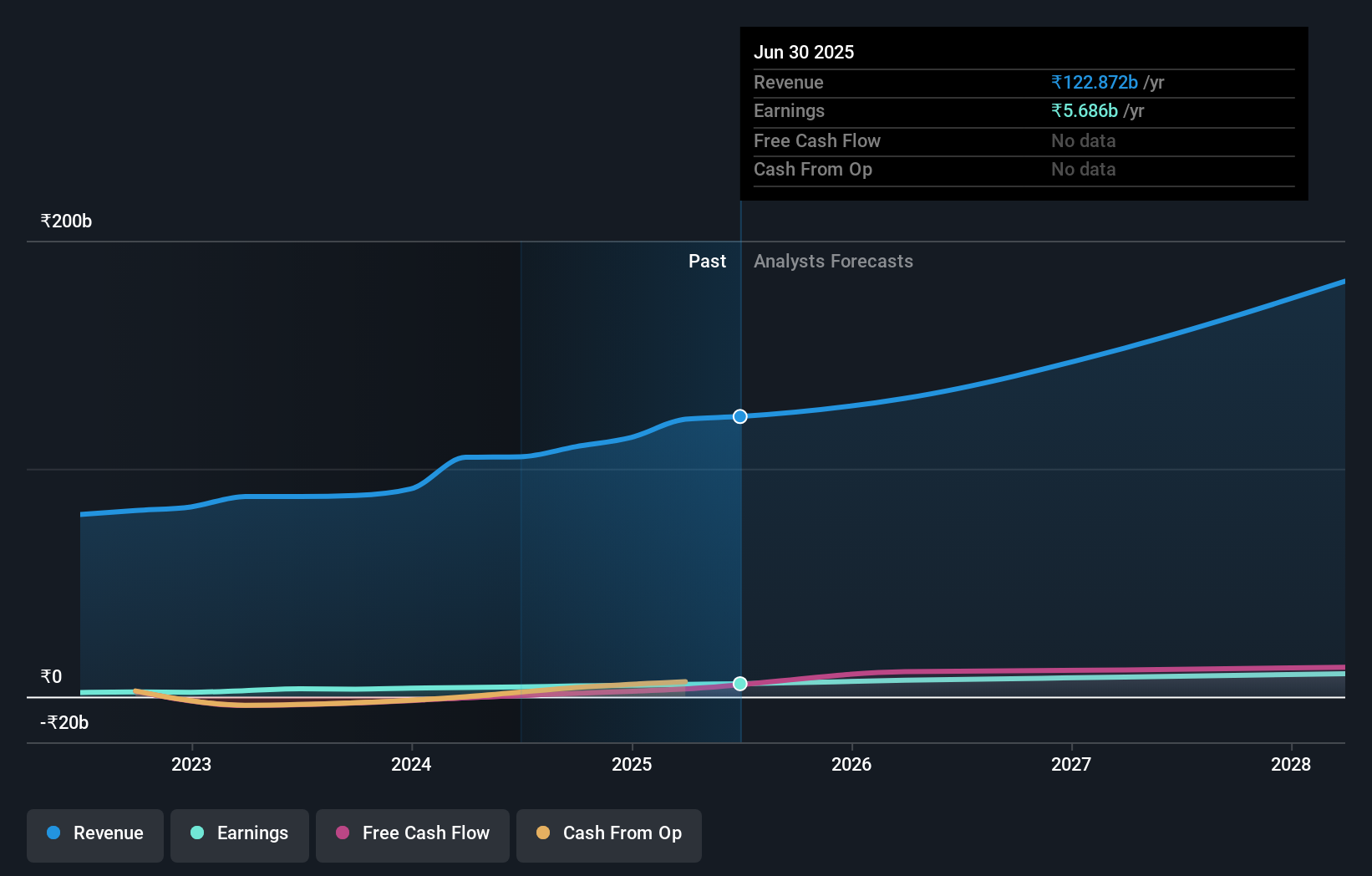- India
- /
- Construction
- /
- NSEI:NBCC
State or government in NBCC (India) Limited (NSE:NBCC) are its biggest bettors, and their bets paid off as stock gained 3.3% last week
Key Insights
- The considerable ownership by state or government in NBCC (India) indicates that they collectively have a greater say in management and business strategy
- The largest shareholder of the company is Ministry of Housing and Urban Poverty Alleviation, Government of India with a 62% stake
- 14% of NBCC (India) is held by Institutions
To get a sense of who is truly in control of NBCC (India) Limited (NSE:NBCC), it is important to understand the ownership structure of the business. The group holding the most number of shares in the company, around 62% to be precise, is state or government. That is, the group stands to benefit the most if the stock rises (or lose the most if there is a downturn).
Clearly, state or government benefitted the most after the company's market cap rose by ₹9.8b last week.
Let's take a closer look to see what the different types of shareholders can tell us about NBCC (India).
View our latest analysis for NBCC (India)

What Does The Institutional Ownership Tell Us About NBCC (India)?
Institutional investors commonly compare their own returns to the returns of a commonly followed index. So they generally do consider buying larger companies that are included in the relevant benchmark index.
As you can see, institutional investors have a fair amount of stake in NBCC (India). This can indicate that the company has a certain degree of credibility in the investment community. However, it is best to be wary of relying on the supposed validation that comes with institutional investors. They too, get it wrong sometimes. When multiple institutions own a stock, there's always a risk that they are in a 'crowded trade'. When such a trade goes wrong, multiple parties may compete to sell stock fast. This risk is higher in a company without a history of growth. You can see NBCC (India)'s historic earnings and revenue below, but keep in mind there's always more to the story.

Hedge funds don't have many shares in NBCC (India). Ministry of Housing and Urban Poverty Alleviation, Government of India is currently the company's largest shareholder with 62% of shares outstanding. This essentially means that they have extensive influence, if not outright control, over the future of the corporation. With 4.6% and 1.9% of the shares outstanding respectively, Life Insurance Corporation of India and quant Money Managers Ltd. are the second and third largest shareholders.
While it makes sense to study institutional ownership data for a company, it also makes sense to study analyst sentiments to know which way the wind is blowing. While there is some analyst coverage, the company is probably not widely covered. So it could gain more attention, down the track.
Insider Ownership Of NBCC (India)
The definition of an insider can differ slightly between different countries, but members of the board of directors always count. Company management run the business, but the CEO will answer to the board, even if he or she is a member of it.
Insider ownership is positive when it signals leadership are thinking like the true owners of the company. However, high insider ownership can also give immense power to a small group within the company. This can be negative in some circumstances.
Our data cannot confirm that board members are holding shares personally. Given we are not picking up on insider ownership, we may have missing data. Therefore, it would be interesting to assess the CEO compensation and tenure, here.
General Public Ownership
With a 25% ownership, the general public, mostly comprising of individual investors, have some degree of sway over NBCC (India). While this size of ownership may not be enough to sway a policy decision in their favour, they can still make a collective impact on company policies.
Next Steps:
It's always worth thinking about the different groups who own shares in a company. But to understand NBCC (India) better, we need to consider many other factors. To that end, you should be aware of the 2 warning signs we've spotted with NBCC (India) .
But ultimately it is the future, not the past, that will determine how well the owners of this business will do. Therefore we think it advisable to take a look at this free report showing whether analysts are predicting a brighter future.
NB: Figures in this article are calculated using data from the last twelve months, which refer to the 12-month period ending on the last date of the month the financial statement is dated. This may not be consistent with full year annual report figures.
Valuation is complex, but we're here to simplify it.
Discover if NBCC (India) might be undervalued or overvalued with our detailed analysis, featuring fair value estimates, potential risks, dividends, insider trades, and its financial condition.
Access Free AnalysisHave feedback on this article? Concerned about the content? Get in touch with us directly. Alternatively, email editorial-team (at) simplywallst.com.
This article by Simply Wall St is general in nature. We provide commentary based on historical data and analyst forecasts only using an unbiased methodology and our articles are not intended to be financial advice. It does not constitute a recommendation to buy or sell any stock, and does not take account of your objectives, or your financial situation. We aim to bring you long-term focused analysis driven by fundamental data. Note that our analysis may not factor in the latest price-sensitive company announcements or qualitative material. Simply Wall St has no position in any stocks mentioned.
About NSEI:NBCC
NBCC (India)
Engages in project management consultancy, engineering procurement and construction, and real estate development businesses in India and internationally.
Solid track record with excellent balance sheet and pays a dividend.
Market Insights
Community Narratives



